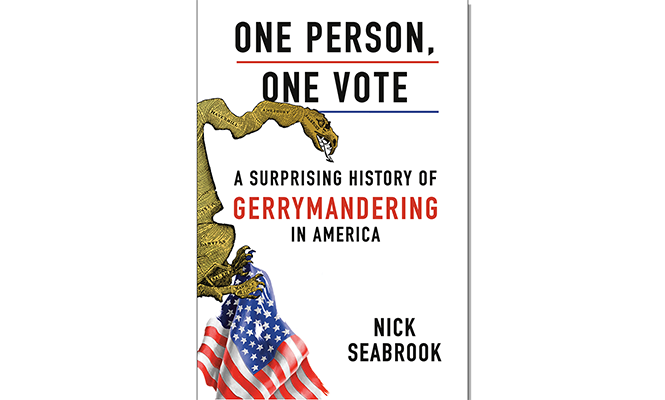Stacking the Deck
One Person, One Vote chronicles the history of American gerrymandering, and what we can do about it.
By Scott Renshaw @scottrenshawAs a native of the U.K., Nick Seabrook had no idea until he came to the U.S. to study that it was possible for politicians to effectively choose their own constituents. It was so strange to him, that it became a focus of his academic attention.
"As someone who is an immigrant, the idea that politicians themselves would be in charge of drawing the districts, I found extraordinary," Seabrook says. "I wanted to find out how that could come about, and why steps hadn't been taken to fix it. Every other country has figured out the lesson to be learned, that whatever mechanism you use to handle this, the one thing you cannot have is politicians controlling that process. Because the temptation is too strong to put your fingers in the cookie jar and start manipulating things."
A professor and Interim Chair of the University of North Florida Department of Political Science and Public Administration, Seabrook has recently published his latest book on the subject, One Person, One Vote: A Surprising History of Gerrymandering in America. In it, he offers examples from the colonial era to the 21st century of how politicians used the drawing of legislative maps to handle personal grudges and consolidate party power. And along the way, he provides some fascinating individual profiles and bits of historical trivia—including the fact that we've been pronouncing "gerrymandering" wrong, since the individual who gave the phenomenon its name, Massachusetts governor Elbridge Gerry, pronounced his name with a hard "G" like "Gary."
While his previous work had been more strictly observational, Seabrook acknowledges that One Person, One Vote finds him "sounding an alarm," as he has identified the increasing harm being caused by modern-day gerrymandering, with fewer and fewer competitive Congressional districts contributing to increased extremism. "I do believe that gerrymandering is getting worse as technology is improving and politicians are getting better at it," Seabrook says.
The question then becomes, "what do we do now"—and the answer, Seabrook believes, isn't to rely on the courts, particularly the Supreme Court. One Person, One Vote chronicles a long history of SCOTUS opinions on gerrymandering cases that attempted to keep the court out of an essentially political matter. Their decisions often seemed contradictory or lacking in firm criteria for proving harm, with different standards for dividing on a racial basis vs. dividing on a political basis.
"It's tempting to want the judiciary to step in and say, 'This is unfair, we should do something about this,'" Seabrook says. "Time and again, they've proven not very good at doing this. There was an inflection point in the 1980s, where gerrymandering was newer in the sense it is now, and opinions hadn't been polarized. ... There was a chance to nip it in the bud, and establish some ground rules against the most egregious examples. But I think that opportunity was missed."
Instead of the time-consuming, expensive and frequently unsuccessful path of seeking judicial remedy, Seabrook argues, the answer really comes at the level of state-level drives for independent redistricting commissions, like the one Utah approved by citizen initiative in 2018. He does recognize, however, that there are many different ways for such apolitical bodies to be created, and that the kind of advisory body existing in Utah—which was mostly ignored when it came to finalizing new state legislative districts this year—leaves too much opportunity for ongoing manipulation.
"I don't think it was surprising, and it was something we've seen in other states," Seabrook says. "New York established an advisory commission just like Utah, and the legislature ignored the recommendations entirely, and went with their own gerrymandered map. ... When these reforms—and the reforms themselves are overwhelmingly popular, almost always approved by the voters—leave any wiggle room, leave the door open a crack for the legislature to reassert its control over the process, they're overwhelmingly likely to do so."
Meanwhile, on a national level, there's still the option for Congress to act, but Seabrook believes that some of the approaches taken thus far have been a missed opportunity. "We have seen some bills introduced to try to eliminate gerrymandering for federal elections," he says, "[but] they've been part of these omnibus voting rights bills, bundled together with a lot of other reforms, some of which are more controversial. I'd like to see it become a stand-alone issue. Some Republicans in [Democratic majority] states like Illinois and New York might get on board. Maybe if we can get Congress to pass legislation to establish commissions, maybe it makes it easier for states to say, 'We'll turn our redistricting over to those commissions as well.'
"The problem is, everything is a crisis these days, and you can talk yourself into [gerrymandering] being something that's necessary. The reforms that are effective are the ones that remove politicians from the process entirely."
More by Scott Renshaw
-
Faces of Salt Lake County book and portrait reception
Images and personal stories in a new book reveal local demographic diversity
- Apr 17, 2024
-
Feature film review: THE BEAST
A filmmaker's compelling ideas get a bit tangled in references to his creative influences.
- Apr 17, 2024
-
Film Reviews: New Releases for April 12
Civil War, Escape from Germany, Coup de Chance, Hundreds of Beavers, La Chimera, Sting
- Apr 11, 2024
- More »
Latest in Arts & Entertainment
Readers also liked…
-
New TV for January 2023
Mayfair Witches, Velma, The Last of Us, Poker Face and more premieres
- Jan 4, 2023





